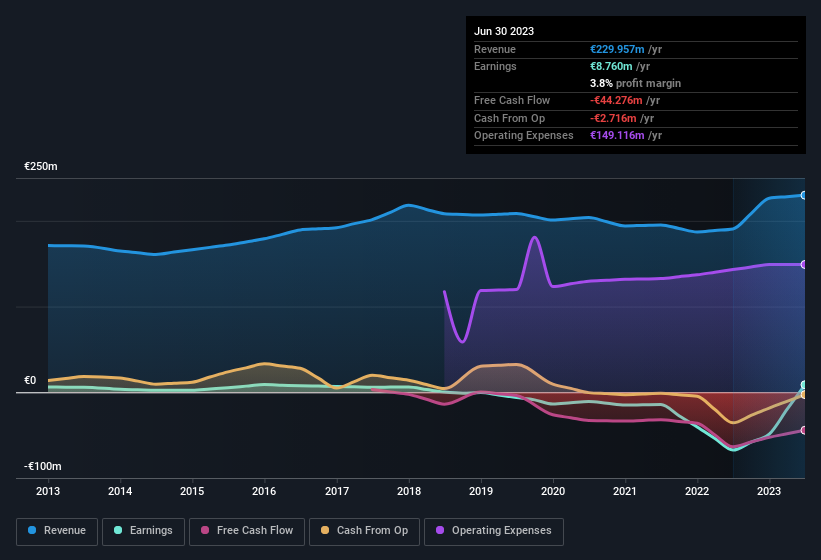- France
- /
- Life Sciences
- /
- ENXTPA:PCA
Statutory Earnings May Not Be The Best Way To Understand PCAS' (EPA:PCA) True Position
PCAS SA's (EPA:PCA) stock rose after it released a robust earnings report. Despite the strong profit numbers, we believe that there are some deeper issues which investors should look into.
Check out our latest analysis for PCAS

Zooming In On PCAS' Earnings
In high finance, the key ratio used to measure how well a company converts reported profits into free cash flow (FCF) is the accrual ratio (from cashflow). To get the accrual ratio we first subtract FCF from profit for a period, and then divide that number by the average operating assets for the period. The ratio shows us how much a company's profit exceeds its FCF.
Therefore, it's actually considered a good thing when a company has a negative accrual ratio, but a bad thing if its accrual ratio is positive. While it's not a problem to have a positive accrual ratio, indicating a certain level of non-cash profits, a high accrual ratio is arguably a bad thing, because it indicates paper profits are not matched by cash flow. That's because some academic studies have suggested that high accruals ratios tend to lead to lower profit or less profit growth.
PCAS has an accrual ratio of 0.71 for the year to June 2023. Statistically speaking, that's a real negative for future earnings. And indeed, during the period the company didn't produce any free cash flow whatsoever. In the last twelve months it actually had negative free cash flow, with an outflow of €44m despite its profit of €8.76m, mentioned above. We also note that PCAS' free cash flow was actually negative last year as well, so we could understand if shareholders were bothered by its outflow of €44m. Having said that, there is more to the story. The accrual ratio is reflecting the impact of unusual items on statutory profit, at least in part. One positive for PCAS shareholders is that it's accrual ratio was significantly better last year, providing reason to believe that it may return to stronger cash conversion in the future. As a result, some shareholders may be looking for stronger cash conversion in the current year.
Note: we always recommend investors check balance sheet strength. Click here to be taken to our balance sheet analysis of PCAS.
How Do Unusual Items Influence Profit?
Given the accrual ratio, it's not overly surprising that PCAS' profit was boosted by unusual items worth €63m in the last twelve months. While it's always nice to have higher profit, a large contribution from unusual items sometimes dampens our enthusiasm. We ran the numbers on most publicly listed companies worldwide, and it's very common for unusual items to be once-off in nature. And, after all, that's exactly what the accounting terminology implies. PCAS had a rather significant contribution from unusual items relative to its profit to June 2023. As a result, we can surmise that the unusual items are making its statutory profit significantly stronger than it would otherwise be.
Our Take On PCAS' Profit Performance
Summing up, PCAS received a nice boost to profit from unusual items, but could not match its paper profit with free cash flow. On reflection, the above-mentioned factors give us the strong impression that PCAS'underlying earnings power is not as good as it might seem, based on the statutory profit numbers. Keep in mind, when it comes to analysing a stock it's worth noting the risks involved. To help with this, we've discovered 3 warning signs (2 can't be ignored!) that you ought to be aware of before buying any shares in PCAS.
In this article we've looked at a number of factors that can impair the utility of profit numbers, and we've come away cautious. But there are plenty of other ways to inform your opinion of a company. For example, many people consider a high return on equity as an indication of favorable business economics, while others like to 'follow the money' and search out stocks that insiders are buying. While it might take a little research on your behalf, you may find this free collection of companies boasting high return on equity, or this list of stocks that insiders are buying to be useful.
New: Manage All Your Stock Portfolios in One Place
We've created the ultimate portfolio companion for stock investors, and it's free.
• Connect an unlimited number of Portfolios and see your total in one currency
• Be alerted to new Warning Signs or Risks via email or mobile
• Track the Fair Value of your stocks
Have feedback on this article? Concerned about the content? Get in touch with us directly. Alternatively, email editorial-team (at) simplywallst.com.
This article by Simply Wall St is general in nature. We provide commentary based on historical data and analyst forecasts only using an unbiased methodology and our articles are not intended to be financial advice. It does not constitute a recommendation to buy or sell any stock, and does not take account of your objectives, or your financial situation. We aim to bring you long-term focused analysis driven by fundamental data. Note that our analysis may not factor in the latest price-sensitive company announcements or qualitative material. Simply Wall St has no position in any stocks mentioned.
About ENXTPA:PCA
PCAS
PCAS SA develops and produces complex molecules for life sciences and specialty chemicals markets.
Slightly overvalued with questionable track record.
Similar Companies
Market Insights
Community Narratives





